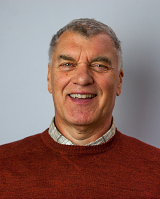Wednesday, November 10 at 7 p.m.
Upper Gwinn Commons,
SPU campus
Free and wheelchair accessible
CONDITIONS OF ENTRY:
- Either proof of full COVID-19 vaccination or a recent negative COVID-19 test will be required as a condition of entry for anyone who is not a current SPU student or employee.
- All current SPU students and employees will need to show their SPU ID card upon entering the event.
*Conditions of entry are in alignment with the recent local vaccination verification order.
About Dr. Rob Wall

Dr. Robert W. Wall is a Seattle native who was educated at Valparaiso University, Dallas Seminary, and Perkins School of Theology. He is an ordained elder of the Free Methodist Church who enjoys an active ecumenical ministry of preaching and teaching scripture in congregations of various faith traditions.
Dr. Wall has worked out his calling in the classroom by teaching thousands of students over many years, in research by publishing over 15 books and dozens of academic and popular articles for both scholars and clergy, and in his service to the faculty governance of this university and through his leadership within the professional guilds of biblical scholars.
Both in his teaching and in his scholarship, Dr. Wall has kept keen and clear focus on two projects. The first is to develop a “canonical approach” to interpretation that determines meaning based on the final or finished form and fit of a biblical text within the church’s two-testament canon, and the contemporary usefulness of meanings produced in forming a faithful reader’s life with God. The second project is to read the church’s scripture as a reliable witness to the triune God, especially oriented by a Wesleyan theological understanding of the Christian faith.
About the Lecture
People remain fascinated by stories of beginnings. Whether they are exciting stories shared by a favorite aunt of a family’s roots or narratives of our human origins told by theologians and scientists, we are interested in how we became to be. Books written on this topic are instant best sellers. Debates over competing narratives of our origins, whether political, sociological, or biological, animate college classrooms and social media.
Over the years, Christian historians have long puzzled over the question of the Bible’s origins because there is no known text or discovered artifact that tells us about when and how the Bible became to be a principal text in the church’s life and work. Yes, theologians have long affirmed that there would be no Bible without the church. After all, it was the church that formed it in the distant past and it remains the church from whom we receive the Bible today in worship, instruction, mission, and witness. But the question remains, what are the Bible’s origins and how did it become the church’s scripture and formative of its faith as God’s people? How can we trust that the decisions made long ago by ancient people about ancient texts are relevant for today’s Christians?
In response, the title of this year’s Walls Lecture reclaims one of scripture’s most famous one-liners to cue the telling of the Bible’s story from the perspective of the Holy Spirit. Drawing upon SPU’s Wesleyan heritage to provide a fresh, bold way of locating and explaining the Spirit’s role in each grand moment of the Bible’s formation, three important biblical passages are used to reimagine its composition, canonization, and communication as a Spirit-drenched production. In doing so, our hope is that scripture’s faithful readers are made more alert to what Professor Wall calls a “participatory pneumatology”—a Bible reader’s partnership with God’s Spirit that actively forms and animates their life with God.
About Paul T. Walls
Paul T. Walls spent 31 years on SPU’s Board of Trustees and was known for his integrity and financial acumen. A successful career in real estate cultivated his ability to help manage the growth of Seattle Pacific from a college into a university. So too did his life of strong and active service to the Free Methodist Church at both local and national levels.
Before his death in 1998, Paul and his wife, Vera, established an educational foundation to help students realize a seminary education that provides the intellectual and spiritual leadership to stimulate and strengthen the denomination into the future.